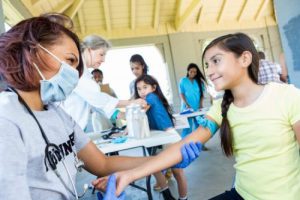First Monkeypox Case Reported in Eastern Idaho
Wednesday August 3, 2022(EASTERN IDAHO) – Eastern Idaho Public Health (EIPH) is announcing the first reported case of monkeypox in
our health district. The patient is receiving outpatient care. EIPH is conducting contact tracing to identify anyone
who may be at risk due to close contact with the patient. Close contacts will be notified, and appropriate steps
recommended.
Monkeypox usually causes a mild illness, and most people recover on their own. Antivirals are available for
patients who might have severe disease or develop complications. The need for vaccine will also be evaluated on
a case-by-case basis for individuals who are or who may have been exposed to monkeypox virus. Currently, there
is no need for broad use of the vaccine or treatment. Individuals with monkeypox should isolate until their
lesions have healed. Monkeypox disease is caused by the monkeypox virus, which is usually found in several
countries in Africa. An international outbreak was first reported in May 2022, with most of the cases likely from
the virus spreading between people. As of August 3 over 6,000 cases of monkeypox have been reported in the
United States, mostly among men who have sex with men.
The virus does not easily spread between people with casual contact, but transmission can occur through contact
with infectious sores and body fluids; contaminated items, such as clothing or bedding; or through respiratory
droplets associated with prolonged face-to-face contact. Some people will have flu-like symptoms — such as a
fever, body aches, and chills — and may have swollen lymph nodes in the days before a rash appears. The rash
may start on any body part as small, red spots. They can become firm and circular with a defined border and may
become pus-filled with an indentation (like a dot) in the middle. Someone with monkeypox is contagious from
the time their symptoms begin until all lesions have healed, and fresh skin has formed. A typical illness lasts two
to four weeks and most people get better on their own without treatment. However, sometimes monkeypox can
lead to more severe illness and in rare cases even be fatal.
Some of the ways you can help prevent infection with monkeypox virus include:
- Wash your hands, especially after contact with possibly infected people and contact with materials like bedding that have touched any lesions.
- Limit direct contact with anyone who has a new rash.
- Stay home except for medical appointments if you have a new rash.
- Isolate from household members and pets if you have a new rash.
- Wear personal protective equipment if caring for someone with monkeypox.
If you have symptoms of monkeypox, you should see your health care provider. Please call ahead for next steps.
For more information, please go here:




